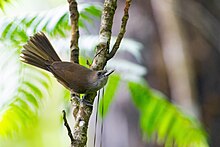The Fiji shrikebill (Clytorhynchus vitiensis) is a songbird species in the family Monarchidae. It is found in American Samoa, Fiji, and Tonga. Its natural habitat is subtropical or tropical moist lowland forests.
| Fiji shrikebill | |
|---|---|

| |
| Scientific classification | |
| Domain: | Eukaryota |
| Kingdom: | Animalia |
| Phylum: | Chordata |
| Class: | Aves |
| Order: | Passeriformes |
| Family: | Monarchidae |
| Genus: | Clytorhynchus |
| Species: | C. vitiensis
|
| Binomial name | |
| Clytorhynchus vitiensis (Hartlaub, 1866)
| |
| Subspecies | |
|
See text | |
| Synonyms | |
| |
Taxonomy and systematics
editThe Fiji shrikebill was originally described as belonging to the genus Myiolestes. Alternate names include the lesser shrikebill and uniform shrikebill.
Subspecies
editTwelve subspecies are recognized:[2]
- Rotuman lesser shrikebill (C. v. wiglesworthi) - Mayr, 1933: Found on Rotuma Island (northern Fiji)
- C. v. brunneus - (Ramsay, EP, 1875): Found on Kadavu, Ono and Vanua Kula (south-western Fiji)
- C. v. buensis – (Layard, EL, 1876): Originally described as a separate species in the genus Myiolestes. Found on Vanua Levu and Kioa (northern Fiji)
- C. v. vitiensis – (Hartlaub, 1866): Found in western Fiji
- C. v. layardi – Mayr, 1933: Found on Taveuni (central Fiji)
- C. v. pontifex – Mayr, 1933: Found on Qamea and Rabi (northern Fiji)
- Vanuatu lesser shrikebill (C. v. vatuanus) – Mayr, 1933: Found on northern Lau Islands (eastern Fiji)
- C. v. nesiotes – (Wetmore, 1919): Originally described as a separate species. Found on southern Lau Islands (eastern Fiji)
- Futuna lesser shrikebill (C. v. fortunae) – (Layard, EL, 1876): Originally described as a separate species in the genus Myiolestes. Found on Futuna and Alofi (north-east of Fiji)
- C. v. heinei – (Finsch & Hartlaub, 1870): Originally described as a separate species in the genus Myiolestes. Found on central Tonga Islands
- C. v. keppeli – Mayr, 1933: Found on Niuatoputapu and Tafahi (northern Tonga)
- Manu’a shrikebill (C. v. powelli) – (Salvin, 1879): Originally described as a separate species. Found on Samoa but may have gone extinct in the 1990s due to habitat destruction
References
edit- ^ BirdLife International (2017). "Clytorhynchus vitiensis". IUCN Red List of Threatened Species. 2017: e.T22707216A118764474. doi:10.2305/IUCN.UK.2017-3.RLTS.T22707216A118764474.en. Retrieved 11 November 2021.
- ^ "IOC World Bird List 6.4". IOC World Bird List Datasets. doi:10.14344/ioc.ml.6.4.
